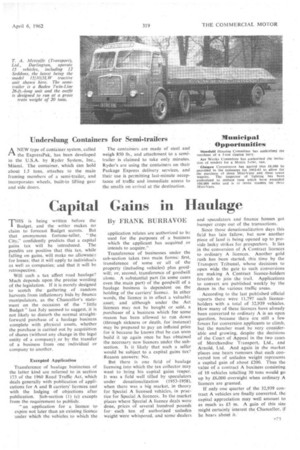Capital Gains in Haulage
Page 57

If you've noticed an error in this article please click here to report it so we can fix it.
By FRANK BURRAVOE
THIS is being written before the 1Budget, and the writer makes no claim to forecast Budget secrets. But that anonymous fortune-teller, "the City,confidently predicts that a capital gains tax will be introduced. The pundits are positive that this tax, while falling on gains, will make no allowanee for losses; that it will apply to individuals as well as companies: and that it will be retrospective.
Will such a tax affect road haulage? Much depends upon the precise wording of the legislation. If it is merely designed to scotch the gathering of random harvests from inflationary bids by finance manipulators, as the Chancellor's statement on the occasion of the " little Budget" last July seemed to suggest, it is not likely to disturb the normal straightforward purchase of a haulage business complete with physical assets, whether the purchase is carried out by acquisition of shares (without any change in the legal entity of a company). or by the transfer of a business from one individual or company to another.
Excepted Application Transference of haulage businesses of the latter kind are referred to in section 173 of the 1960 Road Traffic Act, which deals generally with publication of applications for A and B carriers' licences and with the lodging of objections after publication. Sub-section (1) (c) excepts from the requirement to publish: "an application for a licence to expire not later than an existing licence under which the vehicles to which the application relates are authorized to be used for the purposes of a business which the applicant has acquired or intends to acquire."
Transference of businesses under the sub-section takes two main forms: first, transference of some or all of the property (including vehicles) plus goodwill; or, second, transference of goodwill alone. A substantial part (in some cases even the main part) of the goodwill of a haulage business is dependent on the holding of the carriers' licence. in other words, the licence is in effect a vs aluable asset; and although under the Act licences may not be bought or sold, a purchaser of a business which for some reason has been allowed to run down (through sickness or death, for instance) may be prepared to pay an inflated price for it because he knows that he can soon build it up again once he has obtained the necessary new licences under the subsection. Is it likely that such a seller would be subject to a capital gains tax? Reason answers: No.
But there is one field of haulage licensing into which the tax collector may want to bring his capital gains reaper. It was a field well tilled by speculators under denationalization (1953-1958). when there was a big market, in theory for Special A licensed vehicles, in practice for Special A licences. In the market places where Special A licence deals were done, prices of several hundred pounds foreach ton of authorized unladen weight were whispered, and some dealers
and speculators and finance houses got bumper crops out of the transactions.
Since those denationalization days this field has lain fallow, hut now another piece of land is being opened up to provide lucky strikes for prospectors. It lies in the conversion of A Contract licences to ordinary A licences. Another gold rush has been started, this time by the Transport Tribunal, whose decisions to open wide. the gate to such conversions are making A Contract licence-holders feverish to jointhe trail. Applications to convert are published weekly by the dozen in the various traffic areas.
According to the last published official reports there were 11,797 such licenceholders with a total of 32,939 vehicles. How many of these licences have already been converted to ordinary A is an open question, because there are still a few fences for conversion applicants to climb, but the number must be very consider'able and growing, despite the decisions of the Court of Appeal in the two cases of Merchandise Transport, Ltd., and Arnold, Ltd. And again in the market places one hears rumours that each converted ton of unladen weight represents a capital gain of about £200. Thus the value of a contract A business consisting of 10 vehicles totalling 30 tons would go up by £6,000 overnight when ordinary A licences are granted.
If only one quarter of the 32,939 contract A vehicles are finally converted, the capital appreciation may well amount to as much as £5 m. A gain of this size might certainly interest the Chancellor, if he hears about it.




















































































































































